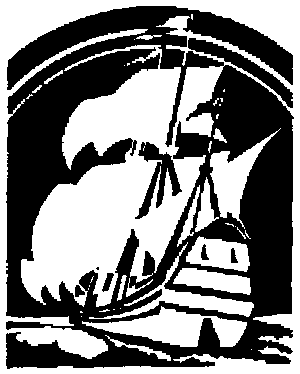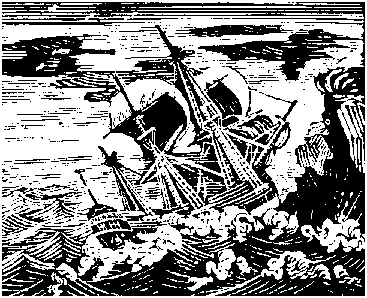An Indianman
--- 1782
Stephen Taylor

-
... the cries of the sailors; the creaking of the ship's sides; the wind in the rigging; the lapping of water; it is universal, ceaseless. And then there are the appalling odours from which there is no escape, that detestable tar, the emanations from that odious galley.
At least to start with, the table fairly groaned with food --- 'a rude kind of plenty', one source called it --- even if the fare was hardly up to the standard that Bengal society was used to. 'Ill-concocted soups, queer-looking ragouts and jelly the colour of salt water,' sniffed one lady.*** The hold contained 40 tons of salted meat, including beef, pork, bacon and tongue, 15 tons of potatoes, 6 tons of flour, 2 tons of cheese, 4 tons of groceries, five barrels of herring, and six chests of oranges and lemons.
Live provisions also came from the bowels of the ship, parts of which resembled a farmyard. The Grosvenor was unusual in not having a cow. Hosea bemoaned a lack of milk --- but carried all the other livestock that turned the fore lower deck on most Indiamen into a crowded manger: pigs, sheep and goats snuffled and bleated shoulder to shoulder in piles of increasingly malodorous hay. The poop was even noisier, being stacked with coops of chickens and ducks, which set up a clamour that carried to the roundhouse below. So notorious was the noise of poultry that when, as often happened, the coops were swept away in a storm, the blow of their loss to the table was considerably softened by the peace of silence overhead.
 Nor were the passengers stinted on drink. There were 2,700 gallons of wine and 500 gallons of spirit for the captain's table, as well as 7,000 gallons of beer and 1,000 of rum for the sailors' grog. Nevertheless, the captain was under instructions to set his passengers 'an example of sobriety and decorum, as he values the pleasure of the Court.' In these respects, Coxon was a model commander.
Nor were the passengers stinted on drink. There were 2,700 gallons of wine and 500 gallons of spirit for the captain's table, as well as 7,000 gallons of beer and 1,000 of rum for the sailors' grog. Nevertheless, the captain was under instructions to set his passengers 'an example of sobriety and decorum, as he values the pleasure of the Court.' In these respects, Coxon was a model commander.
The social focus was the cuddy, a space on the quarterdeck that served as dining room and all-purpose living area, whether for cards or for those occasions given over to spontaneous entertainments, dances or musical performances. A woman passenger wrote of one such occasion during a heavy swell off the Cape:
- All the furniture being removed out of the cuddy, I led off; but had only gone down one couple, when a tremendous lee lurch put us all in confusion. I declined standing up again, but the rest in three or four hours, tumbled about in the prettiest manner, and when no longer able to dance, made themselves amends by singing.
Privacy was the most elusive pleasure. Some passengers virtually took to their cots for the voyage, discovering that reading in bed could be 'a most delectable recreation.' Oil lamps or candles provided light, but because of the fear of fire all flames had to be extinguished in cabins by 10 p.m. It was then, in the late hours, that a solitary spirit might find balm in an hour alone on the quarterdeck, amid the slap of water and billowing sails in all that inky blackness.
- ***The British in India were renowned for their appetites. Mrs Fay, no mean trencher woman herself, gives as a typical menu for dinner in Calcutta: 'A soup, a roast fowl, curry and rice, a mutton pie, a fore quarter of lamb, rice pudding, tarts, very good cheese, fresh churned butter, fine bread, excellent madeira.'
The Wreck of the Grosvenor
and the Strange Fate of Her Survivors
Stephen Taylor
©2004 Norton